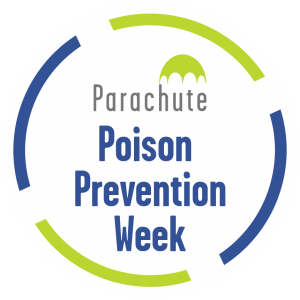
National Poison Prevention Week campaign calls on Canadian residents to #CheckForPoisons among ordinary household items
This page was last reviewed on March 19, 2021
Launching March 21 to 27, Parachute will be calling on Canadian households to #CheckForPoisons and ensure they are stored safety to prevent harm.
March 18, 2021 (Toronto, Ontario) — With many potential poisons in Canadian homes and families spending more time there, it’s more important than ever to know how to safely use and store items such as household cleaners, medications and cannabis products. Parachute is joining forces with our partners across the country to show all Canadians they have the power to #CheckForPoisons and prevent unintentional poisoning at home.
“Each year, more than 4,000 people in Canada lose their lives and more than 20,000 are hospitalized due to poisoning,” says Pamela Fuselli, President and CEO for Parachute, Canada’s national charity dedicated to injury prevention. “To prevent poisonings from unintended exposures to household items, prevention is in your hands: we recommend storing products in their original, child-resistant packaging and keep items tempting to young children, such as pills that look like candy, both out of reach and locked away.”
While cleaning products are not new to Canadian homes, the COVID-19 pandemic has increased focus on handwashing, cleaning and disinfecting. “The number of calls to poison centres regarding hand sanitizers, bleaches and disinfectants grew significantly in 2020, compared to 2019,” says Dr. Margaret Thompson, President of the Canadian Association of Poison Control Centres.” She recommends people review the labels on such products and don’t mix together cleaning products, which can cause chemical reactions that produce dangerous gases.
Every household should have the number of their local poison centre readily available, whether stored in your cellphone or in a visible location, such as on the fridge. “A recent survey conducted by Parachute found that only 40 per cent of Canadian parents know about local poison centres, and the advice they can provide if a child is exposed to a potential posion,” says Fuselli. Go to parachute.ca/poisoning for a complete list of poison centre numbers across Canada.
Other new poison issues to emerge in recent years that impact children include:
- Cannabis edibles, which often resemble common snacks (e.g., cookies, brownies, gummy candies). A young child may be unable to tell the difference and unknowingly consume a large amount.
- Liquid nicotine refills for e-cigarettes, which are sold in flavours that may be appealing to children. Nicotine can be harmful to a child if they put it in their mouth, swallow it or spill it on their skin
- Colourful, transparent laundry detergent pods may look like candies or toys to children. These can harm a child if ingested, or if the liquid squirts into their eyes.
All these should be stored securely out of children’s reach.
Check out our Poison Prevention Week resources: Parachute.ca/PoisonPreventionWeek and join in our awareness campaign on social media using the hashtags #CheckForPoisons and #NPPW2021.
This program is made possible through a financial contribution from Health Canada; the views expressed herein do not necessarily represent the views of Health Canada.
About Parachute
Parachute is Canada’s national charity dedicated to reducing the devastating impact of preventable injuries. Injury is the No. 1 killer of Canadians aged 1 to 34, where on average one child dies every day due to injury. Through education and advocacy, Parachute is working to save lives and create a Canada free of serious injuries. For more information, visit us at parachute.ca and follow us on Twitter, Facebook, Instagram and LinkedIn.
– 30 –
Media Contact
Kelley Teahen
Vice President, Communications and Marketing, Parachute
media@parachute.ca
647-776-5128